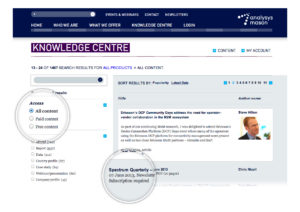This article is part of our monthly “CSM of the Month” feature, in which an SLI Systems Customer Success Manager discusses a current client example.
One of the more interesting projects I’ve been involved in recently is with Analysys Mason, a research and consulting firm who provide detailed articles to their global client base on all issues that relate to the telecoms, media and technology (TMT) sectors. While a large percentage of SLI’s customers are online retailers, we also work with publishing sites like Analysys Mason, the New England Journal of Medicine and Dilbert.com.
Analysys Mason is a great example of how SLI’s site search and navigation technology helps publishing sites improve the user experience and increase the number of page views per visitor. In fact, since implementing SLI they have seen a 21% increase in page views and a 24% increase in unique page views. The average time on site has also increased.
One of the reasons for these improvements is that SLI’s page load times are much faster than Analysys Mason’s previous search. This allows users to more quickly find the articles they’re looking for and leads to an overall better user experience.
Analysys Mason has a vast Knowledge Centre of research articles it has prepared. When I first started working with Analysys Mason, one of their unique needs was to show each user a different set of results based on their specific subscription IDs. This allowed them to have different tiers of subscribers – those with a free account who have more limited access to research, and those paid subscribers who have full access. Now that SLI brings back the correct results for each user based on their login credentials, Analysys Mason is able to make the tiered subscription model work for them.
In the below screen shot, you can see how the Knowledge Centre appears to those who are not logged in. In the left-hand column, the radio buttons under the Access section allow you to refine results based on free or paid content. In the results section, articles that are limited to logged in users display the note Subscription Required.
Analysys Mason also uses SLI’s synonyms tool for search, as it has helped them to expand their vocabulary without having to edit the content database. As an example, a search for ‘MEA’ will pull up results for Middle East and Africa, even if the acronym MEA does not show up in the article title or summary.
By tracking the search terms used on its site through SLI, Analysys Mason is also able to pinpoint specific trends in searches. These analytics allow them to improve upon results for poor search phrases, as well as to know what research papers people are looking for.
Analysys Mason is also very pleased with the search suggestions that automatically appear under each product. This feature is powered by SLI’s Learning Search technology, which directs a user to a related set of results if they can’t find the article they are looking for straight away.
Anyone who has searched for articles on a publishing site knows the frustration of finding nonrelevant results, as well as the satisfaction of finding exactly what you were looking for. I’m happy to work with Analysys Mason to ensure that their customers have a great search experience and spend more and more time on their site.








